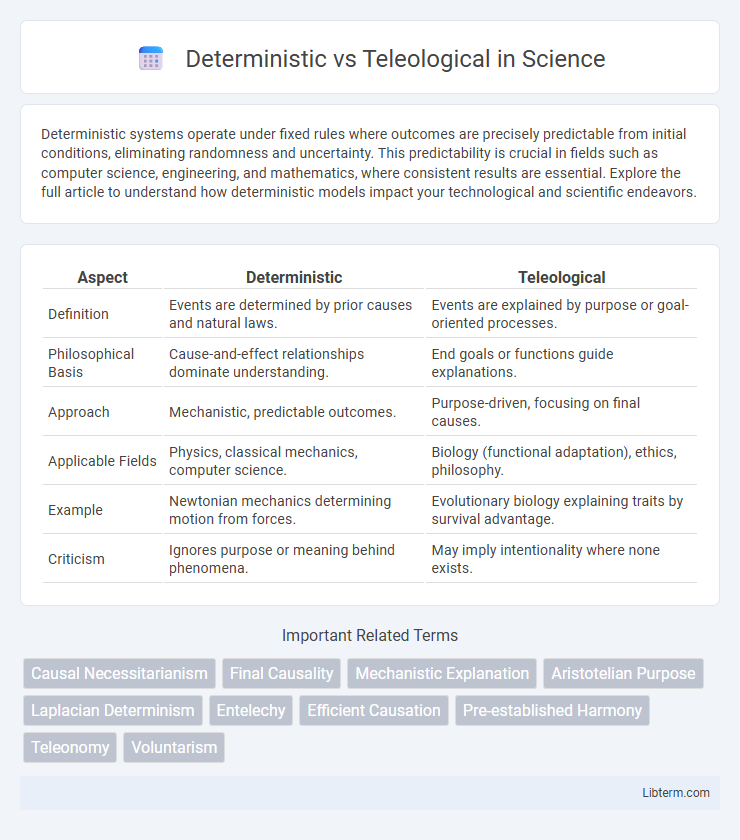Deterministic systems operate under fixed rules where outcomes are precisely predictable from initial conditions, eliminating randomness and uncertainty. This predictability is crucial in fields such as computer science, engineering, and mathematics, where consistent results are essential. Explore the full article to understand how deterministic models impact your technological and scientific endeavors.
Table of Comparison
| Aspect | Deterministic | Teleological |
|---|---|---|
| Definition | Events are determined by prior causes and natural laws. | Events are explained by purpose or goal-oriented processes. |
| Philosophical Basis | Cause-and-effect relationships dominate understanding. | End goals or functions guide explanations. |
| Approach | Mechanistic, predictable outcomes. | Purpose-driven, focusing on final causes. |
| Applicable Fields | Physics, classical mechanics, computer science. | Biology (functional adaptation), ethics, philosophy. |
| Example | Newtonian mechanics determining motion from forces. | Evolutionary biology explaining traits by survival advantage. |
| Criticism | Ignores purpose or meaning behind phenomena. | May imply intentionality where none exists. |
Understanding Determinism: Key Concepts
Determinism is the philosophical concept that every event or state of affairs, including human actions, is determined by preceding events according to causal laws. Key concepts of determinism include causality, necessity, and predictability, emphasizing that given the same initial conditions, events inevitably unfold in a fixed pattern. Understanding determinism involves exploring how factors such as natural laws, genetic predispositions, and environmental influences govern outcomes without randomness or free will.
Defining Teleology: Purpose and Goals
Teleology emphasizes the interpretation of phenomena based on inherent purposes and goals, suggesting that events occur due to predetermined ends or objectives. This perspective contrasts with deterministic views by prioritizing final causes, where actions and processes are explained through the fulfillment of specific intentions. Teleological analysis is widely applied in philosophy, biology, and ethics to understand systems and behaviors by their intended outcomes rather than solely by prior causes.
Historical Perspectives on Determinism and Teleology
Historical perspectives on determinism trace back to ancient Greek philosophers like Democritus, who emphasized atomistic and mechanistic causality, laying the groundwork for deterministic views. In contrast, teleological thinking, rooted in Aristotle's philosophy, interprets natural phenomena as directed toward purposeful ends, emphasizing final causes. The Scientific Revolution challenged traditional teleology by advancing mechanistic explanations, but teleological concepts persisted in biological and philosophical discourse through figures like Kant and later, process philosophers.
Deterministic Frameworks in Science and Philosophy
Deterministic frameworks in science and philosophy propose that every event or state is causally determined by preceding events according to fixed laws, enabling precise predictions and explanations of natural phenomena. These frameworks underpin classical physics, where the universe operates under consistent cause-and-effect relationships, contrasting with teleological approaches that attribute purpose or goals to processes. Determinism's emphasis on causality and predictability shapes scientific methodologies and philosophical debates about free will, causation, and the nature of reality.
Teleological Theories in Ethics and Nature
Teleological theories in ethics focus on the consequences or outcomes of actions to determine their moral value, emphasizing that the ends justify the means. In nature, teleology interprets biological processes and structures as purpose-driven or goal-oriented, suggesting inherent design or function in organisms. These theories contrast with deterministic views by highlighting purposeful behavior and goal achievement rather than fixed causal chains.
Key Differences Between Deterministic and Teleological Approaches
Deterministic approaches emphasize causality and predictability, asserting that events are the inevitable result of preceding conditions, whereas teleological approaches focus on purpose and goal-oriented explanations, interpreting phenomena in terms of final causes or objectives. Determinism relies heavily on laws of nature and fixed sequences, while teleology prioritizes intentions, functions, or end-states as driving factors. The fundamental difference lies in deterministic explanations tracing backward from causes, whereas teleological perspectives project forward toward goals.
Real-World Examples: Determinism vs Teleology
Determinism is exemplified by the laws of physics governing planetary motion, where cause-and-effect relationships predict celestial trajectories with precision. Teleology is evident in biological evolution, where the adaptation of species appears purpose-driven for survival and reproduction. In engineering, deterministic processes guide machine operations through fixed algorithms, while teleological approaches influence design by focusing on end goals and user needs.
Contemporary Debates: Determinism or Teleology?
Contemporary debates on determinism versus teleology center on whether events unfold according to fixed causal laws or purposeful ends. Determinism emphasizes causality and predictability in natural processes, supported by advances in physics and neuroscience. Teleology argues for goal-directedness and intentionality in biological and social phenomena, challenging reductionist interpretations and influencing discussions in philosophy of mind and ethics.
Implications for Human Behavior and Free Will
Deterministic perspectives assert that human behavior is governed by causal laws, suggesting limited free will as actions are predetermined by prior states and external factors. Teleological views emphasize goal-directedness and purposeful behavior, supporting the idea that humans exercise agency and intentionality in decision-making. These contrasting frameworks influence interpretations of moral responsibility, with determinism challenging notions of autonomy, while teleology underlines human capacity for intentional choice and ethical accountability.
Determinism and Teleology: Future Directions and Synthesis
Determinism emphasizes causality where all events are determined by prior states, guiding scientific inquiry into predictive models and mechanistic explanations. Teleology centers on purpose-driven explanations, influencing fields like biology and philosophy by exploring goal-oriented processes and intentionality. Future research aims to synthesize these views, integrating deterministic laws with teleological frameworks to better understand complex systems and emergent phenomena.
Deterministic Infographic

 libterm.com
libterm.com